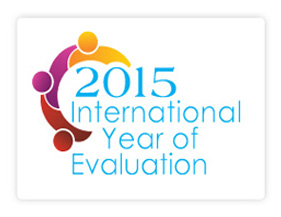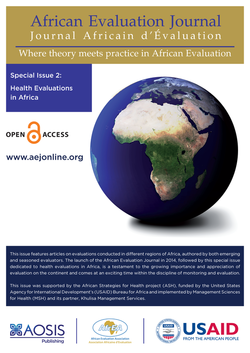
The African Evaluation Association (AfrEA), in collaboration with the United States Agency for International Development (USAID), the African Strategies for Health project (ASH) and Khulisa Management Services, has released a special edition series focusing on health evaluations in Africa, published on the African Evaluation Journal.
The new series brings focus to the growing importance and appreciation of evaluation on the continent and comes at an exciting time within the discipline of monitoring and evaluation. In order to safeguard public health and improve lives, countries must be empowered to strengthen their capacity to generate and use high-quality health information to make evidence-based strategic decisions at local, sub-regional, and national levels. In a global effort to strengthen this capacity, 2015 has been declared as the International Year of Evaluation. The special edition focusing on health evaluations is a unique contribution from the African region to this global movement.
Despite the existence of few national evaluation networks, evaluation capacity-building efforts across Africa have mostly operated in isolation from one another, often unable to mobilize necessary resources and capacities crucial to facilitate effective scale up of evaluation practices within countries. This special edition underscores a uniquely African approach to evaluation, and the multitude of untapped health research and evaluation opportunities and expertise for health evaluation throughout the African region. Spearheaded by AfrEA, the series helps build strategic bridges for African evaluators to connect, network and share experiences with other international partners, with the goal of developing a strong African evaluation community.
The special issue was developed through a unique peer-mentoring approach. It features articles on evaluations conducted in different regions of Africa, authored by both emerging and seasoned evaluators. The nine-paper series includes six English articles, two French articles and one review. It sheds light on African-led evaluation work around key issues currently facing many countries: the provision of sexual and reproductive health services, HIV/AIDS treatment and transmission, children’s rights to quality health services, improved health communications, health systems in fragile states, human resources for health, and disease outbreaks such as the Ebola epidemic in Western Africa. The articles discuss work from Egypt, Nigeria, Guinea, South Sudan, Uganda, Tanzania, and Madagascar.
The new series brings focus to the growing importance and appreciation of evaluation on the continent and comes at an exciting time within the discipline of monitoring and evaluation. In order to safeguard public health and improve lives, countries must be empowered to strengthen their capacity to generate and use high-quality health information to make evidence-based strategic decisions at local, sub-regional, and national levels. In a global effort to strengthen this capacity, 2015 has been declared as the International Year of Evaluation. The special edition focusing on health evaluations is a unique contribution from the African region to this global movement.
Despite the existence of few national evaluation networks, evaluation capacity-building efforts across Africa have mostly operated in isolation from one another, often unable to mobilize necessary resources and capacities crucial to facilitate effective scale up of evaluation practices within countries. This special edition underscores a uniquely African approach to evaluation, and the multitude of untapped health research and evaluation opportunities and expertise for health evaluation throughout the African region. Spearheaded by AfrEA, the series helps build strategic bridges for African evaluators to connect, network and share experiences with other international partners, with the goal of developing a strong African evaluation community.
The special issue was developed through a unique peer-mentoring approach. It features articles on evaluations conducted in different regions of Africa, authored by both emerging and seasoned evaluators. The nine-paper series includes six English articles, two French articles and one review. It sheds light on African-led evaluation work around key issues currently facing many countries: the provision of sexual and reproductive health services, HIV/AIDS treatment and transmission, children’s rights to quality health services, improved health communications, health systems in fragile states, human resources for health, and disease outbreaks such as the Ebola epidemic in Western Africa. The articles discuss work from Egypt, Nigeria, Guinea, South Sudan, Uganda, Tanzania, and Madagascar.

The special issue will be released at the 5th Biennial South African Monitoring and Evaluation Association (SAMEA) Conference, held in South Africa from October 12-16, 2015. This year, more than 500 participants from the region, including evaluation experts from non-government organizations, UN agencies, research organizations and health organizations are expected to participate in SAMEA activities.
The Special Edition on Health Evaluations in Africa is freely available online through the African Evaluation Journal. It was produced with support from the African Strategies for Health project (ASH), funded by USAID’s Bureau for Africa and implemented by Management Sciences for Health (MSH).
The Special Edition on Health Evaluations in Africa is freely available online through the African Evaluation Journal. It was produced with support from the African Strategies for Health project (ASH), funded by USAID’s Bureau for Africa and implemented by Management Sciences for Health (MSH).
- Join the conversation on Twitter at #EvalYear
 RSS Feed
RSS Feed